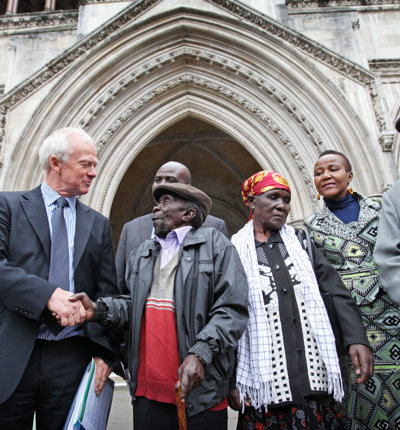
The Mau Mau case - five years on
Five years ago this month, on 5 October 2012, a historic judgment was published in Mutua & Others v Foreign and Commonwealth Office; otherwise known as the “Mau Mau case”. Alex Wessely discusses the case and what made it so unique.
Posted on 06 October 2017
The Mau Mau case represented the first time in British history that victims of colonialism were given the right to claim compensation from the British government for the abuse and suffering they had endured.
This extraordinary claim commenced in 2002 when three Mau Mau representatives knocked on the door of the Stanley Hotel in Nairobi where Martyn Day, senior partner at Leigh Day, was working on another case, and asked him to represent the war veterans.
Over the following years Leigh Day conducted painstaking research into the claims, including joining forces with two renowned historians, Caroline Elkins from Harvard University and David Anderson from Oxford University.
In 2009, Leigh Day commenced a legal action in the High Court in London representing a number of test case victims of the Mau Mau Uprising (1952-1963).
The claims arose from the appalling and systematic abuse and torture inflicted on the Kenyan people by British colonial officials and Kenyan “home guards” under British command.
The abuse included the use of castration, systematic beatings, rape and sexual assault with bottles [Para 45 of the October 2012 judgment]; all of which – as the case revealed – were known about and sanctioned at the top levels of the British government.
Less than 10 years after the end of the Second World War, the British government were rounding up thousands of civilians into mass detention camps all across Kenya and subjecting them to terrible mistreatment, culminating in the Hola Massacre in 1959.
Leigh Day’s first ruling came in July 2011, where Justice McCombe rejected the Government’s argument that the Kenyan government had ‘inherited’ legal responsibility for these abuses upon their Independence. The case came to court again in 2012.
Here, again historically, the government did not dispute that the victims had been tortured “at the hands of the Colonial Administration [Para 27 of the October 2012 judgment].
However, they argued that the case was time barred: that too much time had elapsed since the events took place, meaning a fair trial was no longer possible.
On 5 October 2012 Justice McCombe also rejected this argument. The colonial powers had kept such meticulous records of what was happening in Kenya that a fair trial was possible. These records had been locked away in a missing archive in Hanslope Park, but had just been rediscovered.
They revealed, among other things, minutes of British War Councils where policies on interrogation and “screening” were devised, and the advice given by Kenya’s Attorney General, Eric Griffith Jones, to the Governor of Kenya Sir Evelyn Baring: “if we are going to sin, we must sin quietly”.
So what happened next? In mid 2013 the government agreed to pay £19.9 million in compensation to over 5,000 claimants who had suffered abuse during the Mau Mau Rebellion.
William Hague, the then-foreign secretary, made a statement to the House of Commons, expressing that the government “sincerely regrets that these abuses took place”.
And, the final part of the settlement agreement, a permanent memorial was unveiled in Nairobi in September 2015, commemorating the victims of colonialism.
Just as significantly, this case demonstrated that the horrors of Britain’s colonial past have not been forgotten about. And that even when the opponent is as powerful as the British government, individuals who have been wronged can fight for – and win – justice.

